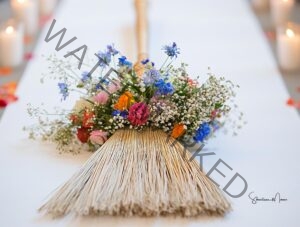
The origin of jumping the broom is difficult to pinpoint. Some trace it back to Ghana, West Africa, where brooms held significance in community rituals, while others argue it has roots in European pagan customs. Enslavers often viewed African spiritual practices as pagan, spiritually empowering, and even threatening to their authority. Despite being mocked or misunderstood by enslavers, the tradition of jumping the broom evolved into a profound symbol of resilience, culture, and survival for enslaved Africans.
In African American culture, honoring our ancestors is everything. It’s about acknowledging the shoulders we stand on, showing respect for the pain and struggles they endured, and recognizing the accomplishments they achieved. Jumping the broom is one of those traditions that keeps us connected to the past while celebrating the future they dreamed of.
This act is more than a photo op. It’s a nod to the daily prayers of our ancestors that continue to manifest today:
Leaping into the future as one
Leaving the past behind
Sweeping away the old
Welcoming the new
Manifestation
And more
Our wedding packages are named in honor of the African American dream—a dream that’s all about freedom, love, and unity.
Marcus Garvey once said, “A people without the knowledge of their past history, origin, and culture is like a tree without roots.” And he wasn’t wrong. Without understanding where you come from, it’s easy to feel ungrounded and disconnected.
European missionaries and colonizers labeled African spiritual practices as “pagan” or “heathen.” To them, anything that wasn’t Christianity was uncivilized, dangerous, and needed to be stamped out. But West African traditions like Vodun, Ifá, and Yoruba were deeply rooted in community, nature, and ancestral respect. Those forced into bondage carried these beliefs across the Atlantic, refusing to let their spirituality be erased.
Unfortunately, those in power viewed these rituals as a threat, a potential spark for rebellion, and tried to suppress them by banning drumming, dancing, and other cultural expressions. But even in secret, our ancestors found ways to keep their traditions alive. That’s power. That’s resilience.
After slavery ended, many Black folks wanted to leave behind anything associated with that painful past, including jumping the broom. They sought to distance themselves from reminders of a time when their love wasn’t recognized by law or community.
But that wasn’t the end of the story.
You may already know how this tradition came back into focus. But for those who don’t, here’s how:
In 1976, Alex Haley’s Roots changed everything. The story of Kunta Kinte and his descendants brought African traditions back into focus. When the series aired on TV, it reintroduced the jumping the broom ritual to millions of people. Suddenly, it wasn’t just a relic of the past—it was a symbol of pride and resilience.
Today, many African Americans include jumping the broom as a way to honor their ancestors, reclaim their cultural heritage, and make their weddings uniquely their own.
When a couple jumps the broom, it’s more than just a gesture. They’re creating a new family, whether or not kids are part of the picture. It’s about unity, respect for the past, and stepping into the future together with love and purpose

There are many ways to create and decorate a jumping broom:
Purchase a premade broom during Halloween or online.
Craft your own with dried grass or straw for a personal touch.
Add colorful flowers, ribbons, and elegant embellishments for a stylish finish.
Ready to include the Jumping the Broom ritual in your ceremony? Contact Maryland Wedding Officiant Rev. Starlene Joyner Burns to honor your heritage with love, dignity, and respect.
In 2004, shortly after graduating from seminary, I received a powerful dream that called me to fight for marriage equality. Guided by faith and a deep commitment to justice, I joined Equality Maryland and worked alongside leaders like Governor Martin O’Malley, Rev. Al Sharpton, and many others in advocacy spearheaded by the Human Rights Campaign.
This work honored LGBTQ couples, biracial couples, and my ancestors, who were denied the legal right to marry. It reaffirmed my unwavering belief in love, equality, and the power of justice. To learn more about the fight for marriage equality and my journey, visit my journal.
Copyright © 2025 STARTUM by sjb Ministries LLC (202) 253-3629